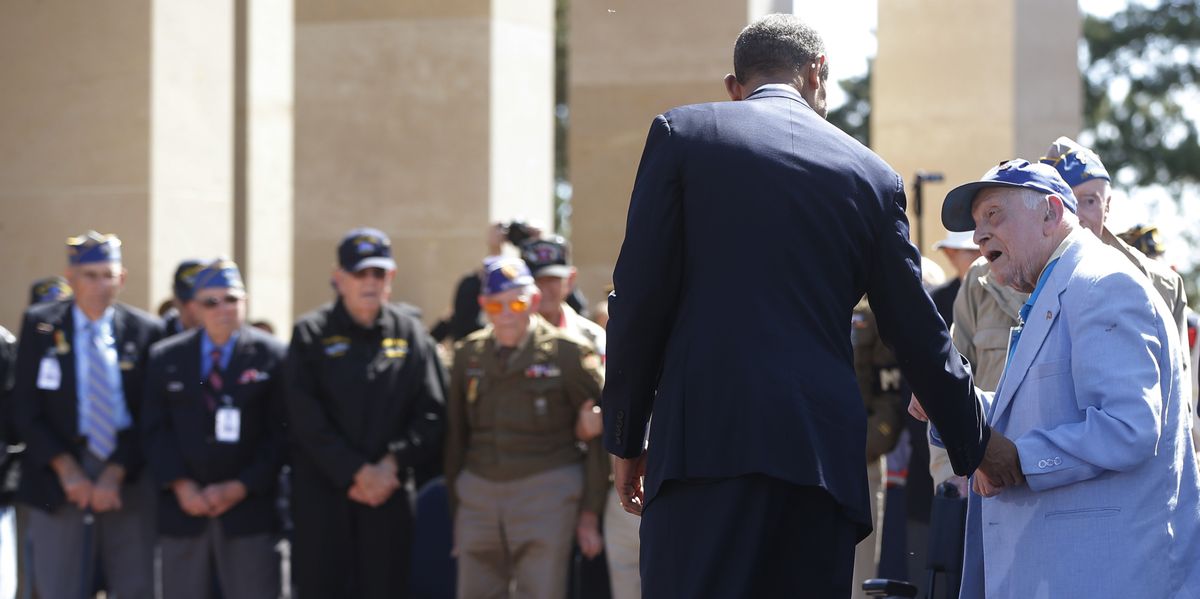World honors D-Day’s fallen
Ceremonies held across Normandy

COLLEVILLE-SUR-MER, France – It was a day of pride, remembrance and honors for those who waded through blood-tinged waves, climbed razor-sharp cliffs or fell from the skies, staring down death or dying in an invasion that portended the fall of the Third Reich and the end of World War II.
It was also a day of high diplomacy for a Europe not completely at peace.
After 70 years, a dwindling number of veterans, civilian survivors of the brutal battle for Normandy, and 19 world leaders and monarchs celebrated on Friday the sacrifices of D-Day, an assault never matched for its size, planning and derring-do.
The events spread across the beaches and lush farmlands of Normandy, in western France, had an added sense of urgency this year: It would be the last grand commemoration for many of the veterans, whether they relived the anniversary at home in silence or were among the roughly 1,000 who crossed continents to be present despite their frail age.
For President Barack Obama, transmitting the memory of their “longest day” means keeping intact the values that veterans fought and died for.
“When the war was won, we claimed no spoils of victory – we helped Europe rebuild,” Obama said in a speech at the Normandy American Cemetery and Memorial. It is the site where 9,387 fallen soldiers rest under white marble tombstones on a bluff above Omaha Beach, the bloodiest among five beach landings by U.S. and British troops.
“This was democracy’s beachhead,” he said, assuring veterans that “your legacy is in good hands.”
F-15 jets flew over the cemetery in missing-man formation, a 21-gun salute boomed and taps sounded.
The day of gratitude drew royals including Queen Elizabeth II of England as well as political leaders from across Europe. German Chancellor Angela Merkel also joined in, along with a small group of German soldiers, as a sign of European unity.
Both symbolism and pragmatism were on French President Francois Hollande’s agenda. With an invitation to Russian President Vladimir Putin, who had been elbowed out of G-7 talks a day earlier, the ceremonies also became a moment to try to deflate the tense situation in Ukraine.
Dancers re-enacted the drama of the Nazi takeover and battles across Europe against Hitler’s forces on a stage at Sword Beach, one of the landing points near Ouistreham, a small port where British troops landed and fought their way to Pegasus Bridge, a key route. Ouistreham was the site of the main international ceremony.
It was 6:30 a.m. on June 6, 1944, when soldiers started wading ashore. Operation Overlord, as the invasion by U.S., British, Canadian and Polish forces was code-named, was the first step in breaching Hitler’s stranglehold on France and Europe. Besides Sword and Omaha, Allied forces landed on Utah, Juno and Gold beaches – all code names.
Ahead of the landing, the U.S. Army’s 2nd Ranger Battalion went in with the 5th Battalion Rangers, scaling the craggy cliffs of Point du Hoc to put out of action six 155 mm Nazi howitzers that could target landing areas. Paratroopers from the 101st Airborne division jumped into dark skies, some getting lost in hedgerows, shot down or caught in trees.
At least 4,400 Allied troops were killed the first day, and many thousands more in the ensuing Battle of Normandy that opened the Allied march to Paris to liberate the Nazi-occupied French capital in August. Another August assault was launched by forces from North Africa into southern France.
“They left home barely more than boys. They came home heroes,” Obama said at an observation deck in Colleville, overlooking Omaha Beach.
Seven decades later, gratitude for life is a theme that runs through some veterans’ recollections.
Clair Martin, 93, of San Diego, California, landed on D-Day with the 29th Infantry Division and said he kept fighting until he reached the Elbe River in Germany the following April. “I praise God I made it and that we’ve never had another World War,” he said.